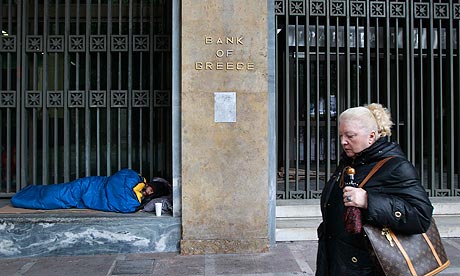Jon Henley meets a woman who has decided to do something – help the unemployed improve their skills and self-confidence
A homeless man sleeps outside the Bank of Greece in central Athens. Photograph: John Kolesidis/Reuters
As Greece enters its fifth straight year of recession, the cuts deepen and the dole queues lengthen, some people are beginning to fight back.
On Monday, in Plaka, Athens' old town, I met Katerina Kanelidou, 42, a leadership coach who decided she had to do something one night a couple of weeks ago when she saw a homeless man outside the station during one of the coldest Athens winters in memory.
"Then on YouTube, I saw someone had posted a video of a pregnant woman being ejected from a homeless shelter," she said. "I was just so shocked. I was thinking, how many unemployed people are going to become homeless? And what kind of society have we become, that we are kicking homeless pregnant women on to the streets?"
Realising she had neither "the power to influence the politicians, or the money to pay for more shelters", Kanelidou decided what she could do was offer her professional experience, providing specially devised, free coaching programmes for the city's unemployed aimed at boosting their self-confidence and skills.
"I just thought: I have to do something," she said. "Yes, there is real depression; huge numbers of people are taking anti-depressants. And a lot of anger at what's happened. But the time for excuses is over now. I am so fed up with the excuses: we can't do anything, we don't have the money, the time, the right paperwork. I have all I need to do something."
So Kanelidou posted on her Facebook page and emailed her contacts, offering coaching sessions to unemployed people on little or no income. She wasn't sure what the take-up would be. "People call us lazy, but we have always worked hard," she said. "There's a huge stigma to being unemployed in Greece. Plus volunteering isn't really a big part of our make-up. There's a mentality that says, if it's free it means either it's no good, or there's a catch somewhere."
But in the space of a few days she attracted 15 participants; more are joining daily. They come from diverse backgrounds: two from a family firm that went bankrupt, a couple of HR professionals, a mid-level company manager, an architect. She has taken on a volunteer assistant.
When the town hall refused to lend her a seminar room on the grounds that she did not represent any professional or corporate body, she persuaded OTE, the Greek state-owned telecoms operator, to give her space in its training centre. "They bypassed their whole bureaucratic procedure to give me the space," she said. "They saw they could do something, too."
The first sessions take place this week. In exchange for the confidence and skills she hopes to impart ("People have the experience and talent, but many need new tools for a new technological environment") she is asking her course members to devise concrete ways in which they, in turn, can do something in their community: "That way, if I am just one person helping one group, each of them will do something for another group."
The press are on to her, and interest is gathering. Longer term, with the programme up and running, she will start looking for sponsors among her corporate contacts to spread the sessions around the city and further afield. For Kanelidou, determined now that optimism and individual action is the only way Greece will haul itself out of the mire, the country's crisis, while it has become financial, is above all a crisis of values.
"What we had became more important than who we were," she said. "Always we looked for shortcuts: just give the official some money, everything will be easier. We failed to take responsibility, and no one was ever accountable. And we stopped engaging with politics; we abdicated. Everyone was drunk on this artificial prosperity … It was a party. A big bubble, and now it's burst. We have to start again, and each one of us has to make it work."
![The [Greek] European Tragedy](https://blogger.googleusercontent.com/img/b/R29vZ2xl/AVvXsEiWKI5s90SFm1wWTk6bs4p7CgslaC2SnYPsrZhb-B-smOufNNCSxCvpBLI9hOB-LsXZjir_PNmEiMk2-E62F3xkg96IoC6QFAaZAnPRTVH340IN9WBRmWJqPkjWlgyRj3zpALp7h6hvA58/s920/GkBack_new.jpg)
